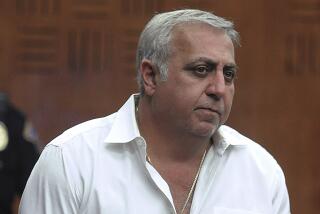Clinton Aide a Middleman, Whitewater Jurors Told
- Share via
LITTLE ROCK, Ark. — Cast as the central figure in a criminal trial in which he is not a defendant, Bruce Lindsey, a longtime aide to President Clinton, was accused Thursday by government prosecutors of bartering state appointments for contributions to Clinton’s 1990 gubernatorial campaign.
Just one day after Lindsey learned that he would be named as an unindicted co-conspirator in the trial of two Clinton contributors, he was portrayed by prosecutor W. Hickman Ewing as the middleman in the alleged scheme that has become a part of the Whitewater controversy.
Ewing, an assistant to Whitewater independent counsel Kenneth W. Starr, said that Lindsey urged the defendants--both officers of the Perry County Bank--to conceal large cash withdrawals by the campaign and then arranged to reward the defendants with appointments to state posts.
Ewing stopped short of branding Lindsey as an unindicted co-conspirator in his opening statement in the trial of Herby Branscum Jr. and Robert M. Hill. The prosecutor has told the defense that he will do so sometime during the trial but he has not said when.
The allegations against Lindsey are embarrassing for the president. But Ewing emphasized that Clinton is not being accused of participating in illegal activity, even though the then-governor is said to have attended a meeting at which the alleged exchange of money for appointments occurred.
“There is no allegation that he did anything wrong,” Ewing said, referring to Clinton.
Lindsey, the deputy White House counsel and a trusted advisor to Clinton for nearly two decades, is the only White House official who has been formally named so far as a result of the Whitewater investigation. The highest-ranking Clinton official to be charged with a crime was former Deputy Atty. Gen. Webster L. Hubbell, who is serving a prison term for expense account fraud.
Both Lindsey and the president are expected to testify in the Branscum-Hill trial, which follows on the heels of the convictions of three other Whitewater defendants: Arkansas Gov. Jim Guy Tucker and Clinton’s former investment partners, James B. and Susan McDougal. As in the previous trial, Clinton’s testimony will be offered through videotape.
Ewing said that Lindsey, who served as Clinton’s 1990 campaign treasurer, dissuaded Perry County Bank officials from reporting a $30,000 cash withdrawal from the campaign’s account immediately before the election. The money was used for so-called get-out-the-vote activities.
Branscum and Hill also are accused of misappropriating $13,217 in bank funds to reimburse themselves, their friends and relatives for campaign contributions to Clinton and other Arkansas politicians.
After the election, according to Ewing, Lindsey rewarded the Perry County bankers for their cooperation by arranging a meeting for Hill with then-Gov. Clinton. During the meeting, he said, Hill presented Clinton with a check for $7,000 and they discussed appointing Branscum to the highway commission. Not only did Branscum get the appointment he wanted, but Hill also was named by Clinton to the state banking board.
In their opening statements, attorneys for Branscum and Hill said that the only person who violated the law was Neal T. Ainley, the bank’s former president and the chief prosecution witness.
By deciding to name Lindsey as an unindicted co-conspirator, legal experts said, the independent counsel now can present testimony about him by Ainley that otherwise would be inadmissible hearsay. Ainley is expected to say that Lindsey told him to conceal the $30,000 withdrawal, according to Ewing. But Alan Snyder, Lindsey’s attorney in Washington, said in an interview Thursday that there are other ways the independent counsel could have introduced Ainley’s testimony about Lindsey without embarrassing the president’s aide by designating him an unindicted co-conspirator.
Special correspondent Ken Miller in Little Rock contributed to this story.
More to Read
Get the L.A. Times Politics newsletter
Deeply reported insights into legislation, politics and policy from Sacramento, Washington and beyond. In your inbox twice per week.
You may occasionally receive promotional content from the Los Angeles Times.










